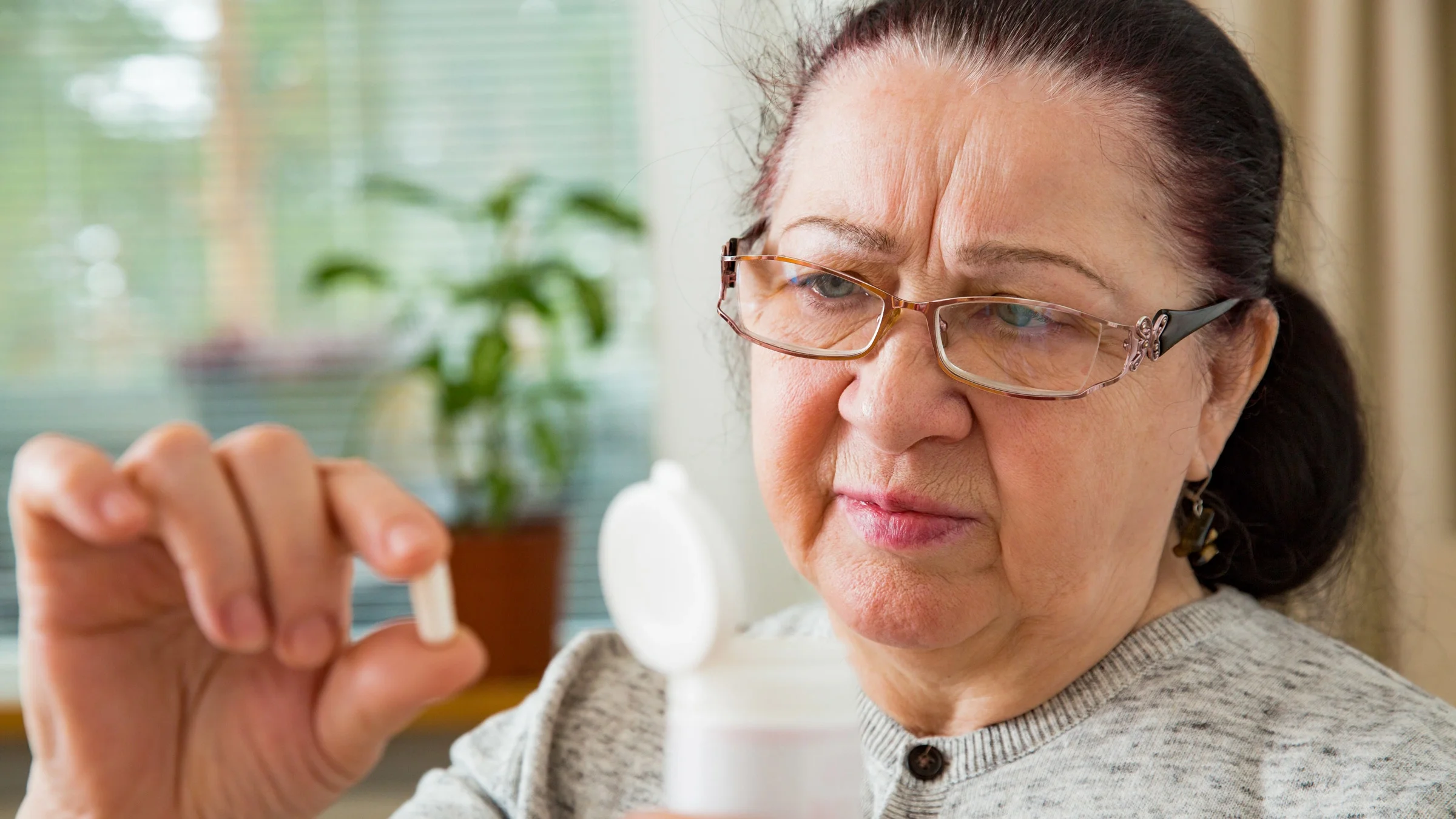Key takeaways:
Topiramate (Topamax) is a common medication. It’s often taken for seizure conditions and to prevent migraines.
Birth control pills interact with topiramate. Other interacting medications include other seizure medications, pioglitazone (Actos), and hydrochlorothiazide (Microzide).
Topiramate can cause drowsiness, confusion, and slower reactions. These side effects may be worse when combined with other substances that cause them — like opioid pain relievers or alcohol.
Save on related medications
Topiramate (Topamax) is one of the top 100 medications prescribed in the U.S. It’s most often taken for seizure conditions and to help prevent migraines. Topiramate can also be used off-label for other health conditions, such as alcohol use disorder.
There are many medications that have topiramate interactions. These can cause a wide variety of complications, including a higher risk of side effects. Let’s look into eight of the most notable.
1. Birth control pills
Topiramate can make oral birth control pills less effective. This can increase the risk of pregnancy and breakthrough bleeding. Even if you don’t experience breakthrough bleeding, birth control pills may still not be as effective for preventing pregnancy.
Researchers aren't quite sure how this interaction occurs. But it may be because topiramate speeds up the breakdown of birth control pills.
Using reliable contraception is important while taking topiramate. This is because this medication can cause certain birth defects, like cleft lip or cleft palate, if taken during pregnancy. If you’re taking topiramate, you could use a backup method of protection, like condoms. You could also consider alternative birth control options. For example, intrauterine devices (IUDs) don’t interact with topiramate.
2. Seizure medications
Topiramate levels may be lower if you also take carbamazepine (Tegretol) or phenytoin (Dilantin, Phenytek). These can make topiramate less effective. Your healthcare provider may raise your topiramate dosage if you start taking one of these.
Topiramate also interacts with another seizure medication, known as valproic acid, in a different way. The combination of topiramate and valproic acid can cause low body temperatures and high blood levels of ammonia. High ammonia can be dangerous if left untreated. Symptoms can include confusion, slurred speech, and severe sleepiness.
There may be times where a healthcare provider prescribes topiramate and valproic acid despite this interaction. If this is the case, they may have you go for regular blood tests to make sure your ammonia levels don’t go too high. If you experience low body temperature and any symptoms of high ammonia, contact your healthcare provider right away.
3. Carbonic anhydrase inhibitors
Topiramate belongs to a group of medications called carbonic anhydrase inhibitors (CAIs). Taking it with other CAIs, such as acetazolamide or zonisamide (Zonegran), can raise the risk of serious side effects.
Of most concern is a greater risk of metabolic acidosis. This is a condition caused by an imbalance of acid and base in the blood. It can be life-threatening if not treated. Symptoms include nausea, vomiting, and rapid breathing.
Even with this topiramate interaction, there are situations where another CAI may be needed. If you’re taking two CAIs, you’ll likely need regular blood tests to watch for signs of metabolic acidosis.
4. Central nervous system depressants
Topiramate can cause central nervous system (CNS) depression. This means it can make you sleepy and slow your reaction time. When topiramate is taken with other CNS depressants, these side effects can become more intense or even dangerous. Other CNS depressants include opioids, benzodiazepines, and alcohol.
Potential complications of this topiramate interaction include:
Slurred speech
Trouble concentrating
Confusion
Dizziness
Dry mouth
Trouble moving
Problems with memory
Low blood pressure
Slowed breathing
Make sure your healthcare provider knows if you take or use other CNS depressants. They may suggest dosage changes or prefer to prescribe alternative medication(s).
You should also discuss with your healthcare provider whether or not you drink alcohol. Drinking alcohol with topiramate can raise the risk of experiencing the symptoms listed above. They’ll let you know if there’s a safe amount you can drink while taking topiramate.
5. Hydrochlorothiazide
Hydrochlorothiazide (Microzide) is a medication used to treat high blood pressure and fluid retention (edema). Topiramate levels may be higher when these two medications are used together. This combination may also make your potassium levels lower.
It’s possible to take both topiramate and hydrochlorothiazide. But some people may need potassium supplements or a lower topiramate dosage to manage this interaction. It isn’t well known if dosage changes need to be made for everyone. Your healthcare provider will monitor you and make changes if needed.
6. Pioglitazone
Pioglitazone (Actos) is a medication used to treat Type 2 diabetes. When combined with topiramate, pioglitazone levels may be lower. This could mean your blood sugar levels are less controlled.
Higher pioglitazone doses may not be needed for everyone. Your healthcare provider may suggest waiting to see how this topiramate interaction affects your blood sugar. Close blood sugar monitoring at home will likely be recommended to make sure you’re meeting your diabetes treatment goals.
7. Lithium
Lithium (Lithobid) is a medication often prescribed for people living with bipolar disorder. Topiramate may raise lithium levels. But this interaction is more concerning if you’re taking higher doses of topiramate (more than 200 mg per day).
The reason for this interaction isn’t fully known. But it may be because both lithium and topiramate are removed from the body by the kidneys. This may make it harder for your kidneys to clear both of them efficiently.
You may need more frequent blood tests to check your lithium levels if you take both medications. High lithium levels can be life-threatening and cause symptoms like severe confusion and uncontrollable vomiting.
8. Amitriptyline
Amitriptyline is a medication approved for depression. But it’s sometimes used off-label for other reasons, such as migraine prevention. Topiramate may raise amitriptyline levels in the body. This may make amitriptyline side effects more likely, including drowsiness or dizziness.
You may still be able to take both topiramate and amitriptyline. Based on how you respond to both medications, you may need a lower amitriptyline dose. Let your healthcare provider know if you start experiencing any new or excessive side effects after starting this combination.
When should I contact my healthcare provider about a topiramate interaction?
Always speak to your healthcare provider and pharmacist when starting any new medications while taking topiramate. This way, they can check for potential interactions. And then make recommendations for how to manage or avoid them.
It’s a good idea to make and maintain a complete medication list. It should include the over-the-counter medications, vitamins, and supplements you take in addition to your prescriptions. A medication list can help your healthcare team better check for interactions.
It's also important to contact your healthcare provider if you start to experience symptoms of a topiramate interaction. This could include new side effects, such as sleepiness or confusion. It can also include a return or worsening of your condition symptoms, such as more frequent seizures or migraines. Your healthcare provider may make adjustments to your medications to manage these symptoms.
The bottom line
Topiramate is a common medication taken to manage seizures and migraines. There are many possible topiramate interactions. This can include birth control pills, diabetes medications, and other seizure medications.
Managing interactions with topiramate may require close follow up or regular blood tests. And sometimes a dosage change is needed. Speak with your healthcare provider and pharmacist before starting any new medications while taking topiramate.

Why trust our experts?


References
Ali, R., et al. (2021). Hyperammonemia. StatPearls.
Burger, M., et al. (2022). Metabolic acidosis.
ClinCalc.com. (2022). Topiramate.
Fariba, K. A., et al. (2022). Topiramate. StatPearls.
Lake Erie Medical DBA Quality Care Products LLC. (2022). Topiramate [package insert].
National Institute on Drug Abuse. (2018). Prescription CNS depressants drugfacts.
NorthStar RxLLC. (2022). Pioglitazone [package insert].
Sprenger, T., et al. (2018). Current prophylactic medications for migraine and their potential mechanisms of action. Neurotherapeutics.
U.S. Food and Drug Administration. (2018). FDA Drug Safety Communication: Risk of oral clefts in children born to mothers taking Topamax (topiramate).


















